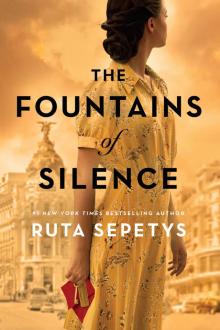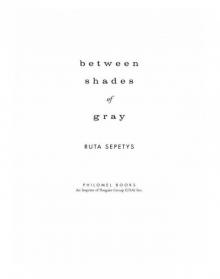- Home
- Ruta Sepetys
Between Shades of Gray
Between Shades of Gray Read online
Table of Contents
Title Page
Copyright Page
Dedication
thieves and prostitutes
Chapter 1
Chapter 2
Chapter 3
Chapter 4
Chapter 5
Chapter 6
Chapter 7
Chapter 8
Chapter 9
Chapter 10
Chapter 11
Chapter 12
Chapter 13
Chapter 14
Chapter 15
Chapter 16
Chapter 17
Chapter 18
Chapter 19
Chapter 20
Chapter 21
Chapter 22
Chapter 23
Chapter 24
Chapter 25
Chapter 26
Chapter 27
Chapter 28
maps and snakes
Chapter 29
Chapter 30
Chapter 31
Chapter 32
Chapter 33
Chapter 34
Chapter 35
Chapter 36
Chapter 37
Chapter 38
Chapter 39
Chapter 40
Chapter 41
Chapter 42
Chapter 43
Chapter 44
Chapter 45
Chapter 46
Chapter 47
Chapter 48
Chapter 49
Chapter 50
Chapter 51
Chapter 52
Chapter 53
Chapter 54
Chapter 55
Chapter 56
Chapter 57
Chapter 58
Chapter 59
Chapter 60
Chapter 61
Chapter 62
ice and ashes
Chapter 63
Chapter 64
Chapter 65
Chapter 66
Chapter 67
Chapter 68
Chapter 69
Chapter 70
Chapter 71
Chapter 72
Chapter 73
Chapter 74
Chapter 75
Chapter 76
Chapter 77
Chapter 78
Chapter 79
Chapter 80
Chapter 81
Chapter 82
Chapter 83
Chapter 84
Chapter 85
EPILOGUE
AUTHOR’S NOTE
Acknowledgements
PHILOMEL BOOKS
A division of Penguin Young Readers Group. Published by The Penguin Group.
Penguin Group (USA) Inc., 375 Hudson Street, New York, NY 10014, U.S.A.
Penguin Group (Canada), 90 Eglinton Avenue East, Suite 700, Toronto, Ontario M4P 2Y3, Canada
(a division of Pearson Penguin Canada Inc.).
Penguin Books Ltd, 80 Strand, London WC2R 0RL, England.
Penguin Ireland, 25 St. Stephen’s Green, Dublin 2, Ireland (a division of Penguin Books Ltd).
Penguin Group (Australia), 250 Camberwell Road, Camberwell, Victoria 3124, Australia
(a division of Pearson Australia Group Pty Ltd).
Penguin Books India Pvt Ltd, 11 Community Centre, Panchsheel Park, New Delhi - 110 017, India.
Penguin Group (NZ), 67 Apollo Drive, Rosedale, North Shore 0632, New Zealand
(a division of Pearson New Zealand Ltd).
Penguin Books (South Africa) (Pty) Ltd, 24 Sturdee Avenue, Rosebank,
Johannesburg 2196, South Africa.
Penguin Books Ltd, Registered Offices: 80 Strand, London WC2R 0RL, England.
Text copyright © 2011 by Ruta Sepetys. Map illustrations copyright © 2011 by Katrina Damkoehler.
All rights reserved. This book, or parts thereof, may not be reproduced in any form without
permission in writing from the publisher, Philomel Books, a division of Penguin Young Readers
Group, 345 Hudson Street, New York, NY 10014. Philomel Books, Reg. U.S. Pat. & Tm. Off.
The scanning, uploading and distribution of this book via the Internet or via any other means
without the permission of the publisher is illegal and punishable by law. Please purchase only
authorized electronic editions, and do not participate in or encourage electronic piracy of copyrighted
materials. Your support of the author’s rights is appreciated. The publisher does not have any control
over and does not assume any responsibility for author or third-party websites or their content.
Published simultaneously in Canada.
Library of Congress Cataloging-in-Publication Data Sepetys, Ruta. Between shades of gray / Ruta Sepetys. p. cm.
Summary: In 1941, fifteen-year-old Lina, her mother, and brother are pulled from their Lithuanian
home by Soviet guards and sent to Siberia, where her father is sentenced to death in a prison camp
while she fights for her life, vowing to honor her family and the thousands like hers by burying her
story in a jar on Lithuanian soil. Based on the author’s family, includes a historical note.
1. Lithuania—History—Soviet occupation, 1940-1941—Juvenile fiction. [1. Lithuania—History—
Soviet occupation, 1940-1941—Fiction. 2. Labor camps—Fiction. 3. Survival—Fiction. 4. Siberia
(Russia)—History—20th century—Fiction. 5. Soviet Union—History—1925-1953—Fiction.]
I. Title. PZ7.S47957Be 2011 [Fic]—dc22 2009050092
eISBN : 978-1-101-47615-4
http://us.penguingroup.com
In memory of Jonas Šepetys
This map is intended to convey the great distance Lina and her family traveled. It is not meant to accurately represent all country borders.
This map is intended to convey the great distance Lina and her family traveled. It is not meant to accurately represent all locations.
thieves and prostitutes
1
THEY TOOK ME IN MY NIGHTGOWN.
Thinking back, the signs were there—family photos burned in the fireplace, Mother sewing her best silver and jewelry into the lining of her coat late at night, and Papa not returning from work. My younger brother, Jonas, was asking questions. I asked questions, too, but perhaps I refused to acknowledge the signs. Only later did I realize that Mother and Father intended we escape. We did not escape.
We were taken.
June 14, 1941. I had changed into my nightgown and settled in at my desk to write my cousin Joana a letter. I opened a new ivory writing tablet and a case of pens and pencils, a gift from my aunt for my fifteenth birthday.
The evening breeze floated through the open window over my desk, waltzing the curtain from side to side. I could smell the lily of the valley that Mother and I had planted two years ago. Dear Joana.
It wasn’t a knocking. It was an urgent booming that made me jump in my chair. Fists pounded on our front door. No one stirred inside the house. I left my desk and peered out into the hallway. My mother stood flat against the wall facing our framed map of Lithuania, her eyes closed and her face pulled with an anxiety I had never seen. She was praying.
“Mother,” said Jonas, only one of his eyes visible through the crack in his door, “are you going to open it? It sounds as if they might break it down.”
Mother’s head turned to see both Jonas and me peering out of our rooms. She attempted a forced smile. “Yes, darling. I will open the door. I won’t let anyone break down our door.”
The heels of her shoes echoed down the wooden floor of the hallway and her long, thin skirt swayed about her ankles. Mother was elegant and beautiful, stunning in fact, with an unusually wide
smile that lit up everything around her. I was fortunate to have Mother’s honey-colored hair and her bright blue eyes. Jonas had her smile.
Loud voices thundered from the foyer.
“NKVD!” whispered Jonas, growing pale. “Tadas said they took his neighbors away in a truck. They’re arresting people.”
“No. Not here,” I replied. The Soviet secret police had no business at our house. I walked down the hallway to listen and peeked around the corner. Jonas was right. Three NKVD officers had Mother encircled. They wore blue hats with a red border and a gold star above the brim. A tall officer had our passports in his hand.
“We need more time. We’ll be ready in the morning,” Mother said.
“Twenty minutes—or you won’t live to see morning,” said the officer.
“Please, lower your voice. I have children,” whispered Mother.
“Twenty minutes,” the officer barked. He threw his burning cigarette onto our clean living room floor and ground it into the wood with his boot.
We were about to become cigarettes.
2
WERE WE BEING ARRESTED? Where was Papa? I ran to my room. A loaf of fresh bread had appeared on my windowsill, a large wad of rubles tucked under the edge. Mother arrived at the door with Jonas clinging close behind her.
“But Mother, where are we going? What have we done?” he asked.
“It’s a misunderstanding. Lina, are you listening? We must move quickly and pack all that is useful but not necessarily dear to us. Do you understand? Lina! Clothes and shoes must be our priority. Try to fit all that you can into one suitcase.” Mother looked toward the window. She quickly slid the bread and money onto the desk and snapped the curtains shut. “Promise me that if anyone tries to help you, you will ignore them. We will resolve this ourselves. We must not pull family or friends into this confusion, do you understand? Even if someone calls out to you, you must not respond.”
“Are we being arrested?” began Jonas.
“Promise me!”
“I promise,” said Jonas softly. “But where is Papa?”
Mother paused, her eyes blinking quickly. “He will be meeting us. We have twenty minutes. Gather your things. Now!”
My bedroom began to spin. Mother’s voice echoed inside my head. “Now. Now!” What was happening? The sound of my ten-year-old brother running about his room pulled a cord within my consciousness. I yanked my suitcase from the closet and opened it on my bed.
Exactly a year before, the Soviets had begun moving troops over the borders into the country. Then, in August, Lithuania was officially annexed into the Soviet Union. When I complained at the dinner table, Papa yelled at me and told me to never, ever say anything derogatory about the Soviets. He sent me to my room. I didn’t say anything out loud after that. But I thought about it a lot.
“Shoes, Jonas, extra socks, a coat!” I heard Mother yell down the hallway. I took our family photo from the shelf and placed the gold frame faceup in the bottom of the empty suitcase. The faces stared back at me, happy, unaware. It was Easter two years before. Grandma was still alive. If we really were going to jail, I wanted to take her with me. But we couldn’t be going to jail. We had done nothing wrong.
Slams and bangs popped throughout the house.
“Lina,” Mother said, rushing into the room, her arms loaded. “Hurry!” She threw open my closet and drawers, frantically throwing things, shoving things into my suitcase.
“Mother, I can’t find my sketchbook. Where is it?” I said, panicked.
“I don’t know. We’ll buy a new one. Pack your clothes. Hurry!”
Jonas ran into my room. He was dressed for school in his uniform and little tie, holding his book bag. His blond hair was combed neatly over to the side.
“I’m ready, Mother,” he said, his voice trembling.
“N-no!” Mother stammered, choking on the word when she saw Jonas dressed for academy. She pulled in an uneven breath and lowered her voice. “No, sweetheart, your suitcase. Come with me.” She grabbed him by the arm and ran down to his room. “Lina, put on shoes and socks. Hurry!” She threw my summer raincoat at me. I pulled it on.
I put on my sandals and grabbed two books, hair ribbons and my hairbrush. Where was my sketchbook? I took the writing tablet, the case of pens and pencils and the bundle of rubles off my desk and placed them amongst the heap of items we had thrown into my case. I snapped the latches closed and rushed out of the room, the curtains blowing, flapping over the loaf of fresh bread still sitting on my desk.
I saw my reflection in the glass door of the bakery and paused a moment. I had a dab of green paint on my chin. I scraped it off and pushed on the door. A bell tinkled overhead. The shop was warm and smelled of yeast.
“Lina, so good to see you.” The woman rushed to the counter to assist me. “What may I help you with?”
Did I know her? “I’m sorry, I don’t—”
“My husband is a professor at the university. He works for your father,” she said. “I’ve seen you in town with your parents.”
I nodded. “My mother asked me to pick up a loaf of bread,” I said.
“Of course,” said the woman, scurrying behind the counter. She wrapped a plump loaf in brown paper and handed it over to me. When I held out the money, she shook her head.
“Please,” whispered the woman. “We could never repay you as it is.”
“I don’t understand.” I reached toward her with the coins. She ignored me.
The bell jingled. Someone entered the shop. “Give your parents our very best regards,” said the woman, moving to assist the other customer.
Later that night I asked Papa about the bread.
“That was very kind of her, but unnecessary,” he said.
“But what did you do?” I asked him.
“Nothing, Lina. Have you finished your homework?”
“But you must have done something to deserve free bread,” I pressed.
“I don’t deserve anything. You stand for what is right, Lina, without the expectation of gratitude or reward. Now, off to your homework.”
3
MOTHER PACKED AN EQUALLY large suitcase for Jonas. It dwarfed his small, thin frame and he had to carry it with both hands, bending backward to lift it off the floor. He didn’t complain of the weight or ask for help.
The sound of breaking glass and china wailed through the house in quick intervals. We found our mother in the dining room, smashing all of her best crystal and china on the floor. Her face glistened with sweat, and her golden ringlets fell loose over her eyes.
“Mama, no!” cried Jonas, running toward the broken shards that littered the floor.
I pulled him back before he could touch the glass. “Mother, why are you breaking your beautiful things?” I asked.
She stopped and stared at the china cup in her hand. “Because I love them so much.” She threw the cup to the floor, not even pausing to see it break before reaching for another.
Jonas began to cry.
“Don’t cry, darling. We’ll get much nicer things.”
The door burst open and three NKVD officers entered our house carrying rifles with bayonets. “What happened here?” demanded a tall officer, surveying the damage.
“It was an accident,” Mother replied calmly.
“You have destroyed Soviet property,” he bellowed.
Jonas pulled his suitcase close, fearful that any minute it, too, might become Soviet property.
Mother looked in the foyer mirror to affix her loose curls and put on her hat. The NKVD officer slammed her in the shoulder with the butt of his rifle, throwing her face-first into the mirror. “Bourgeois pigs, always wasting time. You won’t need that hat,” he scoffed.
Mother righted and steadied herself, smoothing her skirt and adjusting her hat. “Pardon me,” she said flatly to the officer before fixing her curls again and sliding her pearl hatpin into place.
Pardon me? Is that really what she said? These men burst into our home at night, sla
m her into the mirror—and she asks them to pardon her? Then she reached for it, the long gray coat, and suddenly I understood. She was playing the Soviet officers like a careful hand of cards, not quite sure what might be dealt next. I saw her in my mind, sewing jewelry, papers, silver, and other valuables into the coat under the lining.
“I have to use the bathroom,” I announced, trying to divert the attention from my mother and the coat.
“You have thirty seconds.”
I shut the bathroom door and caught sight of my face in the mirror. I had no idea how quickly it was to change, to fade. If I had, I would have stared at my reflection, memorizing it. It was the last time I would look into a real mirror for more than a decade.
4
THE STREETLAMPS HAD been turned off. It was nearly black in the road. The officers marched behind us, forcing us to keep pace with them. I saw Mrs. Raskunas peer out of her curtains. The moment she saw me looking, she disappeared. Mother nudged at my arm, which meant that I should keep my head down. Jonas was having a hard time carrying his suitcase. It was banging against his shins.
“Davai!” commanded an officer. Hurry, always hurry.
We marched into the intersection of the street, toward a large dark object. It was a truck, surrounded by more NKVD. As we approached the rear of the vehicle, I saw people sitting inside on their luggage.
“Boost me up before they do,” Mother whispered quickly, not wanting an officer to touch her coat. I did as she asked. The officers pushed Jonas up. He fell on his face, his luggage thrown on top of him. I made it without falling, but when I stood up, a woman looked at me and clasped her hand to her mouth.
“Lina, dear. Button your coat,” instructed Mother. I looked down and saw my flowered nightgown. In the rush and search for my sketchbook, I had forgotten to change. I also saw a tall, wiry woman with a pointy nose looking at Jonas. Miss Grybas. She was a spinster teacher from school, one of the strict ones. I recognized a few others: the librarian, the owner of a nearby hotel, and several men I had seen Papa speaking with on the street.

 Salt to the Sea
Salt to the Sea The Fountains of Silence
The Fountains of Silence Between Shades of Gray
Between Shades of Gray